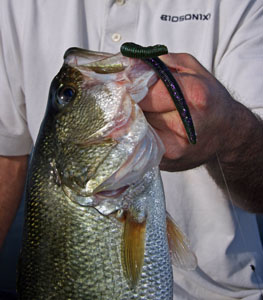 There
is no one-size-fits all lure. We know this, but there is one whose
diverse applicability to broad spectrum of presentations makes it
the Swiss Army Knife of bass fishing. Talking ‘bout the
soft plastic stick bait – simple in form, but complex in capability.
There
is no one-size-fits all lure. We know this, but there is one whose
diverse applicability to broad spectrum of presentations makes it
the Swiss Army Knife of bass fishing. Talking ‘bout the
soft plastic stick bait – simple in form, but complex in capability.
No doubt, you can put these slender, blunt-ended worms to serious
use, but what I like most about stickbaits is how well the fit into
a casual day of fishing. Grab a few different sizes and colors, select
some spare hooks, pack everything into a Zip-Loc bag and off you go.
With a small lake
behind my office, I often spend morning coffee breaks and lunch hours
on “research missions” with the local green
fish. Easily, 90 percent of the time, I’m slinging a stickbait – as
much for time management, as for the bait’s proven largemouth
appeal. Think about it, when you have a short window of opportunity,
less time spent rigging and retying means more time fishing.
Common stickbait models include the classic Yamamoto Senkos, Wave
Tiki Sticks, Yum Dingers, Zoom Mag Finesse Worms, Berkley Sinking Minnow,
Lunch Money Trick Sticks and TriggerX Flutter Worms. Each follow the
same general shape and anglers ultimately gravitate toward the ones
with which they develop the most confidence. In the water column, stick
baits undulate enticingly to mimic struggling, vulnerable prey. Elsewhere,
that limber composition means exciting action from any viewpoint.
Probably the most
diverse method for fishing soft stickbaits is weightless Texas rigged.
This basic arrangement works well for pitching to bed fish, probing
laydowns, or skipping under docks. What’s great
about this tactic is that you can instantly switch from a surface presentation,
to subsurface, to dead sticking by simply adjusting your retrieve speed.
Most soft stick worms are dense enough to reach bottom on their own
in shallow water of about six feet or less. However, when retrieved
at a moderate speed with a high rod tip and frequent twitches, the
bait will remain at the surface. With upward rod strokes, you can emulate
the nose-up walking action of a topwater plug, but if a fish boils
or strikes and misses, killing the bait makes it fall like wounded
prey. Resume the action subsurface and a stickbait now works the mid-depths.
 One of my favorite ways to fish a weightless Texas-rigged stickbait
is to skip it across lily pads. Epitomizing reaction presentations,
skipping keeps the bait moving across the pads to imitate a variety
of forage from snakes, to frogs, to lizards, to aquatic insects. With
no contour points like a lizard or creature bait, a stick is less likely
to grab a patch of tangled weeds, or bunch up in the notch of a lily
pad.
One of my favorite ways to fish a weightless Texas-rigged stickbait
is to skip it across lily pads. Epitomizing reaction presentations,
skipping keeps the bait moving across the pads to imitate a variety
of forage from snakes, to frogs, to lizards, to aquatic insects. With
no contour points like a lizard or creature bait, a stick is less likely
to grab a patch of tangled weeds, or bunch up in the notch of a lily
pad.
Cast deep into
the pads, keep your rod tip high and retrieve with frequent upward
rod twitches. Dancing the bait across the vegetation and through
the little gaps between pads give bass plenty of notice that something’s
moving overhead, but they get only a brief glimpse of the passing
prey. This forces the fish to make a decision and act decisively,
often bumping the pads in an effort to knock your stickbait into
the water.
Similarly, wriggling
a stickbait across weed mats will bring hungry bass charging through
the canopy to grab the intruder. And similar to the open water tactics,
killing the bait over breaks in vegetation makes it fall into these “windows” through
which bass watch for vulnerable forage. If a weed window looks particularly
promising, switch to a flipping technique and drop your stickbait
repeatedly into the target zone where it slowly falls like a wounded
baitfish.
Offset wide gap
(OWG) hooks offer more bite and they make it easier to keep the bait
in place. However, a straight round bend worm hook maintains a streamlined
profile that helps you hop and skip the bait over pads and other
stiff weeds with minimal snagging. Hooks that protrude farther from
the bait often grab weeds and even if it doesn’t
fully snag, that temporary pause can displace your bait and mar the
presentation. For longer bait life, use a pegging style hook like the
Owner TwistLock or Daiichi’s Hitchhiker.
Now, in some cases,
digging down into the salad is a good way to tempt your quarry. When
this is the objective, fit that Texas-rigged stickbait with a 1/16-
to ¼-ounce
bullet weight and watch how easily it comes through the vegetation.
Look for many of your strikes to occur right when the worm pops out
of the weeds.
Of course, we can’t talk about soft plastic stickbaits without
noting their superb wacky-rigging performance. Indeed, with a hook
stuck through the bait’s middle – or under an O-ring – the
worm wiggles at both ends. Options include weedless wacky hooks and
weighted hooks for the flick shake presentation.
Other uses for
soft plastic stickbaits include dropshotting, shaky heads and Carolina
rigs. You’ll
probably need different rods for all of these options, but you can
catch fish on each with the simple, yet effective soft plastic stickbait.
Through his professional writing business, Tight Line
Communications (www.tightwords.com),
David A. Brown offers journalism and marketing communication
services.

